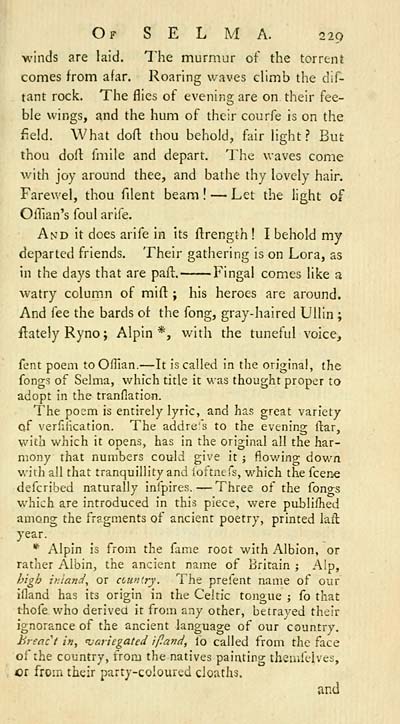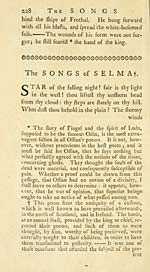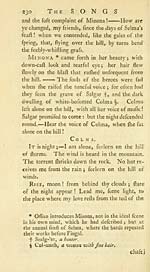Download files
Complete book:
Individual page:
Thumbnail gallery: Grid view | List view

Of S E L M a. iig
winds are laid. The murmur of the torrent
comes from afar. Roaring waves climb the dif-
tant rock. The flies of evening are on their fee-
ble wings, and the hum of their courfe is on the
field. What doft thou behold, fair light? But
thou doll: fmile and depart. The waves come
with joy around thee, and bathe thy lovely hair.
Farewel, thou filent beam ! — Let the light of
Oilian's foul arife.
And it does arife in its ftrength ! I behold my
departed friends. Their gathering is on Lora, as
in the days that are paft. Fingal comes like a
watry column of mift ; his heroes are around.
And fee the bards ot the fong, gray-haired Ullin ;
flatelyRyno; Alpin *, with the tuneful voice,
fent poem toOflian. — It is called in the original, the
fongs of Selma, which title it was thought proper to
adopt in the tranflation.
The posm is entirely lyric, and has great variety
of verfilkation. The addre's to the evening liar,
\Ai\\ which it opens, has in the original all the har-
mony that numbers could give it ; flowing down
with all that tranquillity and ioftnefs, which the fcene
defcribed naturally infpires. — Three of the fongs
which are introduced in this piece, were publiihed
among the fragments of ancient poetry, printed lafl
year.
* Alpin is from the fame root with Albion, or
rather Albin, the ancient name of Britain ; Aip,
high inland^ or country. The prefent name of our
ifland has its origin in the Celtic tongue ; fo that
thofe who derived it from any other, betrayed their
ignorance of the ancient language of our country.
hreact in^ njariegated ip.and, lo called from the face
of the country, from the natives painting theuifelves,
Qi from their party-coloured cloaths.
and
winds are laid. The murmur of the torrent
comes from afar. Roaring waves climb the dif-
tant rock. The flies of evening are on their fee-
ble wings, and the hum of their courfe is on the
field. What doft thou behold, fair light? But
thou doll: fmile and depart. The waves come
with joy around thee, and bathe thy lovely hair.
Farewel, thou filent beam ! — Let the light of
Oilian's foul arife.
And it does arife in its ftrength ! I behold my
departed friends. Their gathering is on Lora, as
in the days that are paft. Fingal comes like a
watry column of mift ; his heroes are around.
And fee the bards ot the fong, gray-haired Ullin ;
flatelyRyno; Alpin *, with the tuneful voice,
fent poem toOflian. — It is called in the original, the
fongs of Selma, which title it was thought proper to
adopt in the tranflation.
The posm is entirely lyric, and has great variety
of verfilkation. The addre's to the evening liar,
\Ai\\ which it opens, has in the original all the har-
mony that numbers could give it ; flowing down
with all that tranquillity and ioftnefs, which the fcene
defcribed naturally infpires. — Three of the fongs
which are introduced in this piece, were publiihed
among the fragments of ancient poetry, printed lafl
year.
* Alpin is from the fame root with Albion, or
rather Albin, the ancient name of Britain ; Aip,
high inland^ or country. The prefent name of our
ifland has its origin in the Celtic tongue ; fo that
thofe who derived it from any other, betrayed their
ignorance of the ancient language of our country.
hreact in^ njariegated ip.and, lo called from the face
of the country, from the natives painting theuifelves,
Qi from their party-coloured cloaths.
and
Set display mode to: Large image | Transcription
Images and transcriptions on this page, including medium image downloads, may be used under the Creative Commons Attribution 4.0 International Licence unless otherwise stated. ![]()
| Early Gaelic Book Collections > Ossian Collection > Fingal, an ancient epic poem > (267) |
|---|
| Permanent URL | https://digital.nls.uk/77450202 |
|---|
| Description | Selected books from the Ossian Collection of 327 volumes, originally assembled by J. Norman Methven of Perth. Different editions and translations of James MacPherson's epic poem 'Ossian', some with a map of the 'Kingdom of Connor'. Also secondary material relating to Ossianic poetry and the Ossian controversy. |
|---|
| Description | Selected items from five 'Special and Named Printed Collections'. Includes books in Gaelic and other Celtic languages, works about the Gaels, their languages, literature, culture and history. |
|---|

